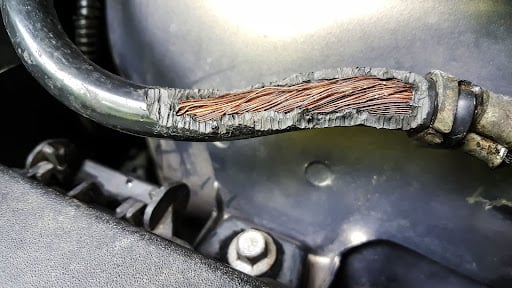Ticks are arguably some of the most dangerous bugs in New Jersey. While you may be used to your dog bringing home ticks occasionally, ticks can be incredibly damaging to human health.
Not only are ticks notorious progenitors of Lyme Disease, but some strains of Lone Star Ticks have even started carrying a special molecule that makes people allergic to red meat.
That’s why we’ve outlined nine essential tips for keeping your yard tick-free to keep you and your family’s health safe.Request a Free, No-Obligation Quote
Request a Free, No-Obligation Quote
Why Are Ticks in My Yard?
Ticks are parasites that travel from place to place by latching themselves onto other animals. These animals include deer, squirrels, raccoons, foxes, and other types of rodents. Therefore, keeping your yard free of these critters will go a long way in keeping your yard tick-free.
Furthermore, ticks are also attracted to shade and moisture grass, so they will typically hide amidst tall grass or low-hanging shrubs. So, even if you cut your grass, you must still be wary about bringing your pet near any backyard bushes.
What Diseases Do Ticks Carry?
Ticks can carry several diseases, with the most common being Lyme disease. Each year, approximately 476,000 Americans are diagnosed and treated for Lyme disease, according to the CDC. In addition to Lyme disease, ticks can also carry Rocky Mountain Spotted Fever, babesiosis, ehrlichiosis, and tularemia, all of which cause symptoms that are hard to diagnose.
The most common types of ticks in New Jersey include the Deer Tick and the American Dog Tick.
9 Ways to Prevent Ticks in Your Yard
1. Maintain Landscaping
One of the best ways to prevent ticks from hanging around your yard is to maintain your landscaping. This includes regularly mowing your grass to a short length and trimming any overgrown bushes or shrubbery in your yard. Clean up any loose brush or debris that may be housing ticks or other pests, such as cockroaches.
2. Apply Mulch
Adding a protective mulch barrier around your yard can prevent ticks, as ticks will not cross a mulch border. While ticks may still enter your yard by hitching a ride on animals or people, applying a strip of mulch at least a couple of feet wide can significantly reduce the amount of ticks you see around your property.
3. Avoid Shaded and Wooded Areas
Ticks prefer to hide in shaded and wooded areas, so avoiding spending too much time in these places can reduce your chances of being bitten. When going into a wooded area, take necessary precautions, such as wearing long clothing that covers your skin and boots that go past your ankles.
4. Repel Deer from Your Yard
As cute as they are, deer are some of the biggest culprits for unknowingly giving ticks a ride into your yard. There are several all-natural methods you could use to repel deer from your yard without hurting them, such as planting strong-smelling herbs like lavender, rosemary, and garlic outside your home.
5. Use Tick Tubes
Tick tubes are DIY contraptions designed to kill ticks that travel on mice. The tubes resemble nesting material used by mice, which attract the tick-covered mice to their habitat and kill any ticks using a special pesticide. That pesticide is known as permethrin, and it’s soaked in cotton, which is placed inside the cardboard tubes to kill any ticks that enter.Request a Free, No-Obligation Quote
Request a Free, No-Obligation Quote
6. Apply an Insecticide
There are a ton of different insecticides available to kill ticks, with permethrin (the chemical used in tick tubes) being one of the most effective. Other store brands of insecticides include Ortho, Hot Shot, and Spectracide, though it is imperative that you carefully follow the directions when applying any of these chemicals to ensure you are doing it properly and avoid poisoning yourself or your pets.
7. Grow Plants with Strong Scents
Several plants are known to deter ticks with their strong scent, including lavender, rosemary, sweet basil, and garlic. In addition to repelling ticks from your property, you’ll also have a nice backyard herb garden!
8. Inspect for Ticks Regularly
Inspecting yourself, your loved ones, and your pets for ticks after spending time outdoors is imperative for preventing the many diseases these pests carry. This is especially important if you have just come in from a hike through the woods or after walking through high grass, as ticks are more prevalent in these areas.
9. Hire an Exterminator
When in doubt, it is always best to hire a professional exterminator to handle a tick problem. A trusted pest control professional will be able to assess your property for ticks and determine the specific course of treatment needed to eliminate the problem.
Read more for additional tips on how to get rid of ticks on your property.
How to Protect Your Pets from Ticks
Ticks are not always avoidable, but there are several ways you and your pet can protect yourself from contact with any ticks.
- Keep your pet groomed and bathe them regularly. This will help you spot any ticks that may be hiding in your pet’s coat.
- Ask your vet about the best flea and tick collar for your pet. Conduct some research, as these collars do contain chemicals that may or may not be harmful to pets.
- Inspect your pet for ticks anytime they come in from spending time outdoors in wooded or forested areas where ticks hide.
- Educate yourself on how to remove ticks properly. Tick removal tools are incredibly cheap and available at most drug stores and pet stores.
Luckily, maintaining a tick-free yard will also help you combat other pests.
For year-round tick prevention, check out Anchor Pests’ Pest Protect 365 Program or contact us for further information.
FAQs: Tick Yard Prevention
How do ticks enter my yard in the first place?
Ticks will typically enter a backyard on the backs of other animals, such as deer or rodents. Once they arrive, they will establish themselves, typically in a dark and damp habitat. Ticks can often hide in tall grass and moist dirt, where they can hide and protect themselves.
Can ticks survive in all types of weather?
While the ideal weather for ticks is warm with high humidity, these pests are extremely resilient and can thrive in just about any weather. However, ticks are typically less active during the colder months, so you may not notice as many of them from October through March.
What should I do if I find a tick on my pet?
If you find a tick on your pet, you should try to remove it if possible. To remove a tick, part your pet’s fur until you see the tick burrowed into its skin. Using clean tweezers, grab the tick as close to your pet’s skin as possible and pull it straight upward. After the tick is removed, check the area to make sure the entire tick was removed, and bathe your pet with a flea and tick shampoo.
How often should I mow my lawn to prevent ticks?
A good rule of thumb is to mow your lawn about once a week to keep your grass neatly trimmed and to avoid creating an ideal environment for ticks. This is especially important during the summer months when ticks are most active.Request a Free, No-Obligation Quote



